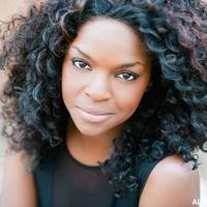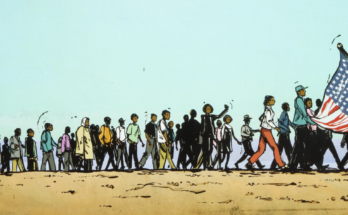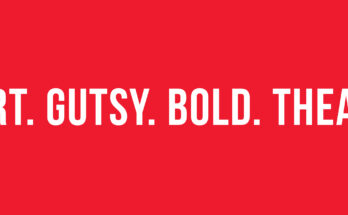“The Book of Mormon” makes its first Atlanta stop ever Jan. 28-Feb. 9 at the Fox Theatre.
::
Samantha Marie Ware’s grandmother gave a diplomatic answer when she saw Samantha perform the female lead in The Book of Mormon. “She was a little taken aback,” recalls Ware, who plays Nabulungi. “She said she definitely liked my part, but I don’t know if she’ll see it again.”

For such a runaway hit, The Book of Mormon is by no means the kind of mainstream musical guaranteed to please all audiences. Its creators built their reputations on irreverent, envelope-pushing satire: Robert Lopez offered an adult version of “Sesame Street” with Avenue Q, while Emmy winners Trey Parker and Matt Stone make sport of everything under the sun in the long-running animated series “South Park.” For The Book of Mormon, the trio blends their wicked comedic sensibilities with an unabashed love for old-school musicals.
WINNER OF NINE TONY AWARDS, The Book of Mormon follows two naïve Mormons — ambitious Elder Price and fib-telling Elder Cunningham — on a seemingly fruitless mission to Uganda. Ware, as Nabulungi, plays a young villager who tries to keep her spirits up despite the disease, poverty and armed conflict around her. Most of the humor comes at the expense of the missionaries, with Nabulungi providing much of the show’s heartfelt sincerity.
“In a way, she’s the anchor of the show,” says Ware. “Trey Parker always reminded me to capture her innocence. They did not want to make fun of her. Nothing she says is intended to be a joke.” Ware’s big solo, “Sal Tlay Ka Siti,” tweaks classic aspirational songs as sheltered Nabulungi envisions Salt Lake City as a paradise with friendly warlords and “all the goat meat you can eat.”
The Book of Mormon offers sly interpretations of decades of Broadway musical styles — an uproarious misreading of the life of Joseph Smith emulates “The Small House of Uncle Thomas” number from The King and I. Parker, Stone and Lopez specifically namecheck The Lion King multiple times. The stage version of The Lion King, coincidentally, gave Ware with her first big break. The Nebraskan dropped out of a small liberal arts college to pursue theater in Chicago, where she auditioned for the Disney juggernaut and ended up performing the role of the lioness Nala for eight months in Las Vegas.
Ware concedes the similarities in The Lion King and Mormon.
“Both are set in Africa. There’s a part in Lion King when they run out of food and water, and Nala has to set off and find more, so that’s similar to my character,” she says. “But mostly they’re not very much alike.”

Nevertheless, one of Mormon’s show-stoppers riffs on Lion King’s “Hakuna Matata.” The newly arrived missionaries discover that the villagers have a saying, “Hasa Diga Eebowai,” to help them through the troubled times. (“Does it mean ‘No worries for the end of your days?’ ” “ ‘Kind of!’ ”). The catchy melody builds to an uproariously profane and blasphemous punch line, which Ware finds both very funny and very real. “In the show, the plight of Uganda is very authentic. It’s uncomfortable humor. They’re cursing God and throwing up their middle fingers, as if to say, ‘Look at the poverty and disease we have to deal with every day.’ They’re letting out their anger for six minutes [in song].”
FOLLOWING HER VEGAS STINT AS NALA, Ware moved to New York, making her Broadway debut in Book of Mormon. She replaced Tony winner Nikki M. James for six weeks before embarking on the show’s national tour. After 15 months, Ware finds that different parts of the country respond differently to the show.
“The dynamics of audiences will always change,” she says. “In the South, they always enjoy the show, but they’re more hesitant to laugh. Some don’t know if it’s OK to laugh out loud at some of the humor, so it’s harder to play off them. They’ll be polite and modest during the show, but give us ovations at the end. But we also always have those people who laugh at everything. We can hear them onstage.”
She finds that most audiences recognize The Book of Mormon’s sincerity beneath its silliness. “It’s not parodying Mormonism, but every religious belief, if you’re paying attention,” says Ware. “It’s just a bald-faced way of telling a basic story. There are satiric qualities and numbers that satirize specific musical styles, but Matt and Trey are satirizing the things they love.”



